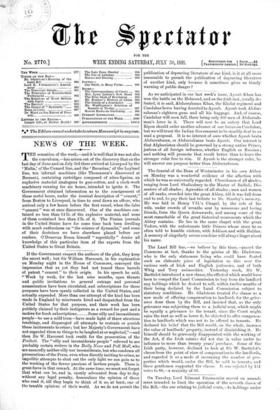The Land Bill has,—we believe by this time,—passed the Commons
at last, thanks to the genius of Mr. Gladstone, who is the only statesman living who could have floated such an elaborate piece of legislation as this over the various reefs of Irish and English jealousies, and of both Whig and Tory animosities. Yesterday week, Sir W. Barttelot introduced a new clause, the effect of which would have been to compel the Land Commission to buy from the landlord any holdings which he desired to sell, within twelve months of their being declared by the Land Commission subject to statutory conditions. Mr. Gladstone treated tize clause as a new mode of offering compensaf ion to landlords for the griev- ance done them by the Bill, and insisted that, as the only grievance was subjecting them to a judicial rent, which might be equally a grievance to the tenant, since the Court might raise the rent as well as lower it, he objected to offer compensa- tion to landlords which was not to be offered to tenants. He declared his belief that the Bill would, on the whole, increase the value of landlords' property, instead of diminishing it. He himself should be grievously disappointed with the working of the Act, if the Irish estate3 did not rise in value under its influence to more than twenty years' purchase. Some of the Irish party, however, declined to look at Sir W. Barttelot's clause from the point of view of compensation to the landlords, and regarded it as a mode of increasing the number of pro- perties which would, under the Bill, be sold to tenants, and these gentlemen supported the clause. It was rejected by 151 votes to 88,—a majority of 63.


































